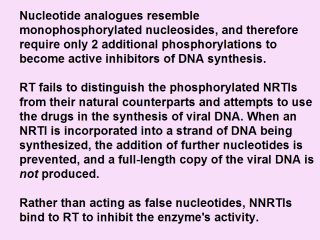| front |1 |2 |3 |4 |5 |6 |7 |8 |9 |10 |11 |12 |13 |14 |15 |16 |17 |18 |19 |20 |21 |22 |23 |24 |25 |26 |27 |28 |29 |30 |31 |32 |33 |34 |35 |36 |37 |review |
 |
Unphosphorylated
nucleoside analogues such as zidovudine, didanosine, zalcitabine, lamivudine
and stavudine rely on cellular nucleoside kinase for conversion to
their active triphosphate forms. PIs bind to the active site of the viral protease enzyme, preventing the processing of viral proteins into functional forms. Viral particles are still produced when the protease is inhibited, but these defective particles cannot ineffective new cells. Fusion inhibitors prevent HIV from entering target cells. Drugs of this class bind to the HIV envelope protein gp41 involved in viral entry. By blocking the interactions between regions of the gp41 molecule, fusion inhibitors interfere with the conformational change (folding) of the envelope molecule required for fusion with the target cell membrane. Health care providers can prescribe non-nucleoside,RT inhibitors (NNRTIs), such as delvaridine (Rescriptor), nevirapine (Viramune), and efravirenz (Sustiva), in combination with other antiretroviral drugs. |